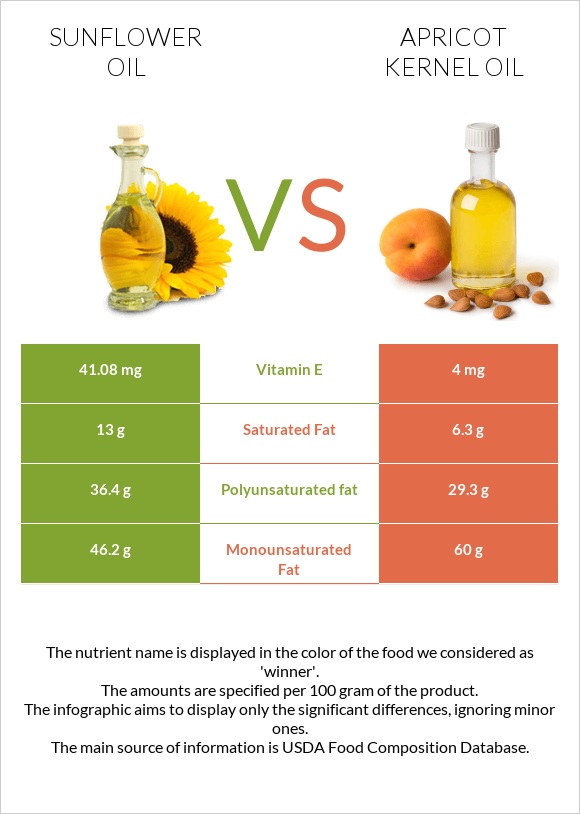Sunflower oil vs. Apricot kernel oil — In-Depth Nutrition Comparison
Compare
A recap on the differences between sunflower oil and apricot kernel oil
- Sunflower oil has more vitamin E and polyunsaturated fat; however, apricot kernel oil is higher in monounsaturated fat.
- Sunflower oil covers your daily vitamin E needs 247% more than apricot kernel oil.
- Apricot kernel oil contains 2 times less saturated fat than sunflower oil. Sunflower oil contains 13g of saturated fat, while apricot kernel oil contains 6.3g.
Food varieties used in this article are Oil, sunflower, linoleic, (partially hydrogenated) and Oil, apricot kernel.
Infographic

Infographic link
Mineral Comparison
Mineral comparison score is based on the number of minerals by which one or the other food is richer. The "coverage" charts below show how much of the daily needs can be covered by 300 grams of the food.
Vitamin Comparison
Vitamin comparison score is based on the number of vitamins by which one or the other food is richer. The "coverage" charts below show how much of the daily needs can be covered by 300 grams of the food.
| Contains more Vitamin EVitamin E | +927% |
| Contains more Vitamin KVitamin K | +∞% |
All nutrients comparison - raw data values
| Nutrient |  |
 |
DV% diff. |
| Vitamin E | 41.08mg | 4mg | 247% |
| Polyunsaturated fat | 36.4g | 29.3g | 47% |
| Monounsaturated fat | 46.2g | 60g | 35% |
| Saturated fat | 13g | 6.3g | 30% |
| Vitamin K | 5.4µg | 5% | |
| Calories | 884kcal | 884kcal | 0% |
| Fats | 100g | 100g | 0% |
Macronutrient Comparison
Macronutrient breakdown side-by-side comparison
Protein:
0 g
Fats:
100 g
Carbs:
0 g
Water:
0 g
Other:
0 g
Protein:
0 g
Fats:
100 g
Carbs:
0 g
Water:
0 g
Other:
0 g
~equal in
Protein
~0g
~equal in
Fats
~100g
~equal in
Carbs
~0g
~equal in
Water
~0g
~equal in
Other
~0g
Fat Type Comparison
Fat type breakdown side-by-side comparison
Saturated fat:
Sat. Fat
13 g
Monounsaturated fat:
Mono. Fat
46.2 g
Polyunsaturated fat:
Poly. Fat
36.4 g
Saturated fat:
Sat. Fat
6.3 g
Monounsaturated fat:
Mono. Fat
60 g
Polyunsaturated fat:
Poly. Fat
29.3 g
| Contains more Poly. FatPolyunsaturated fat | +24.2% |
| Contains less Sat. FatSaturated fat | -51.5% |
| Contains more Mono. FatMonounsaturated fat | +29.9% |




